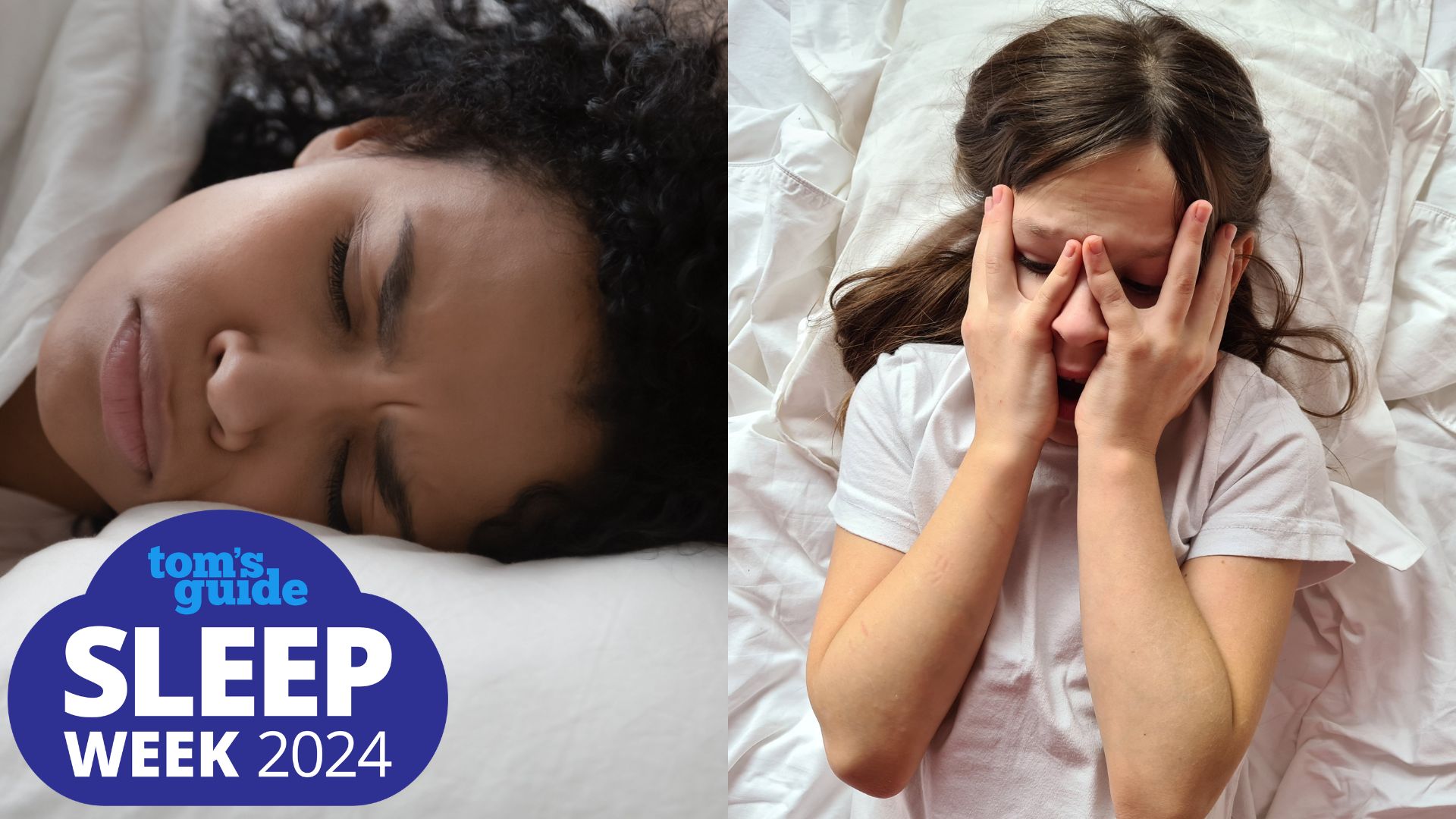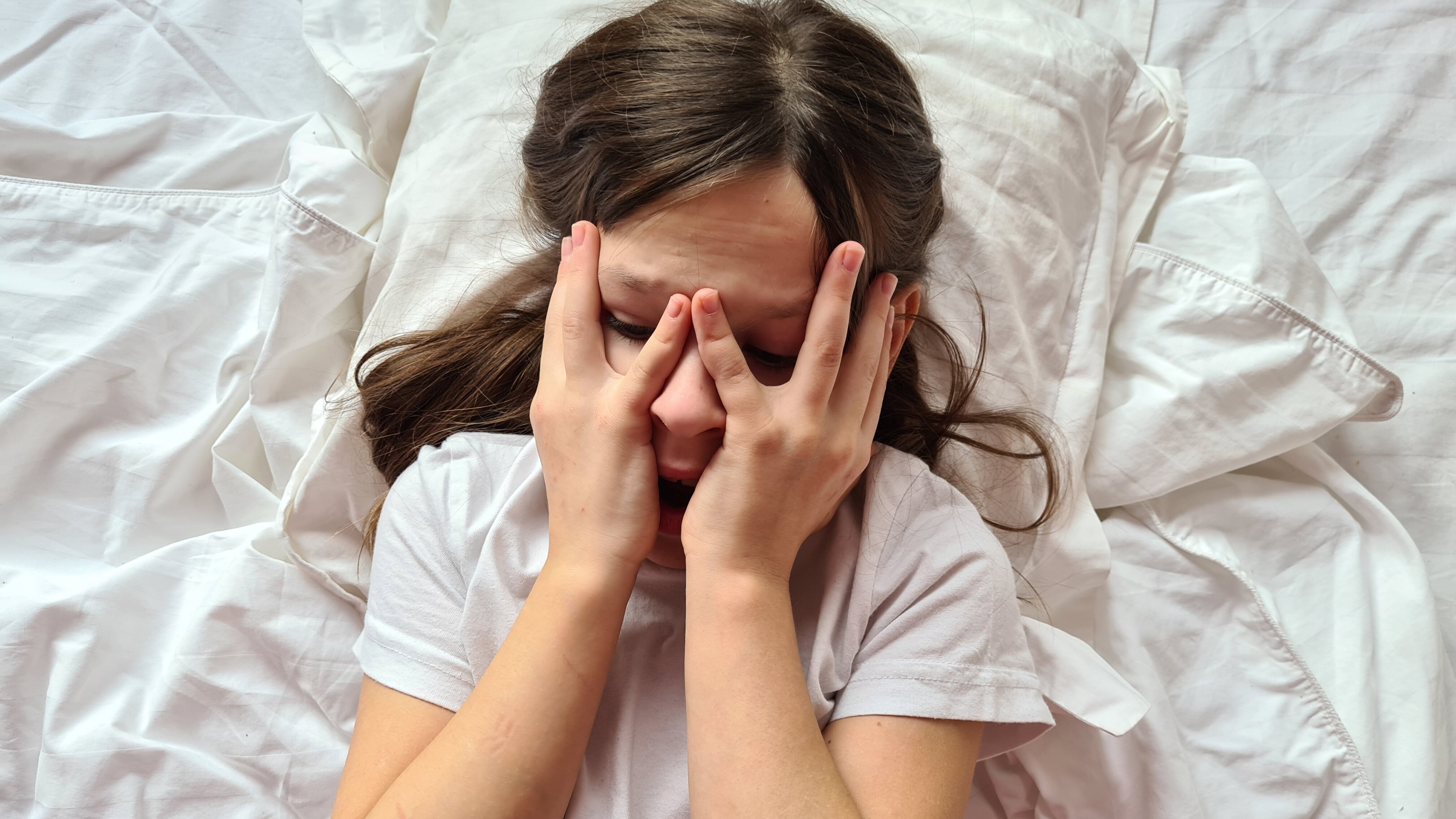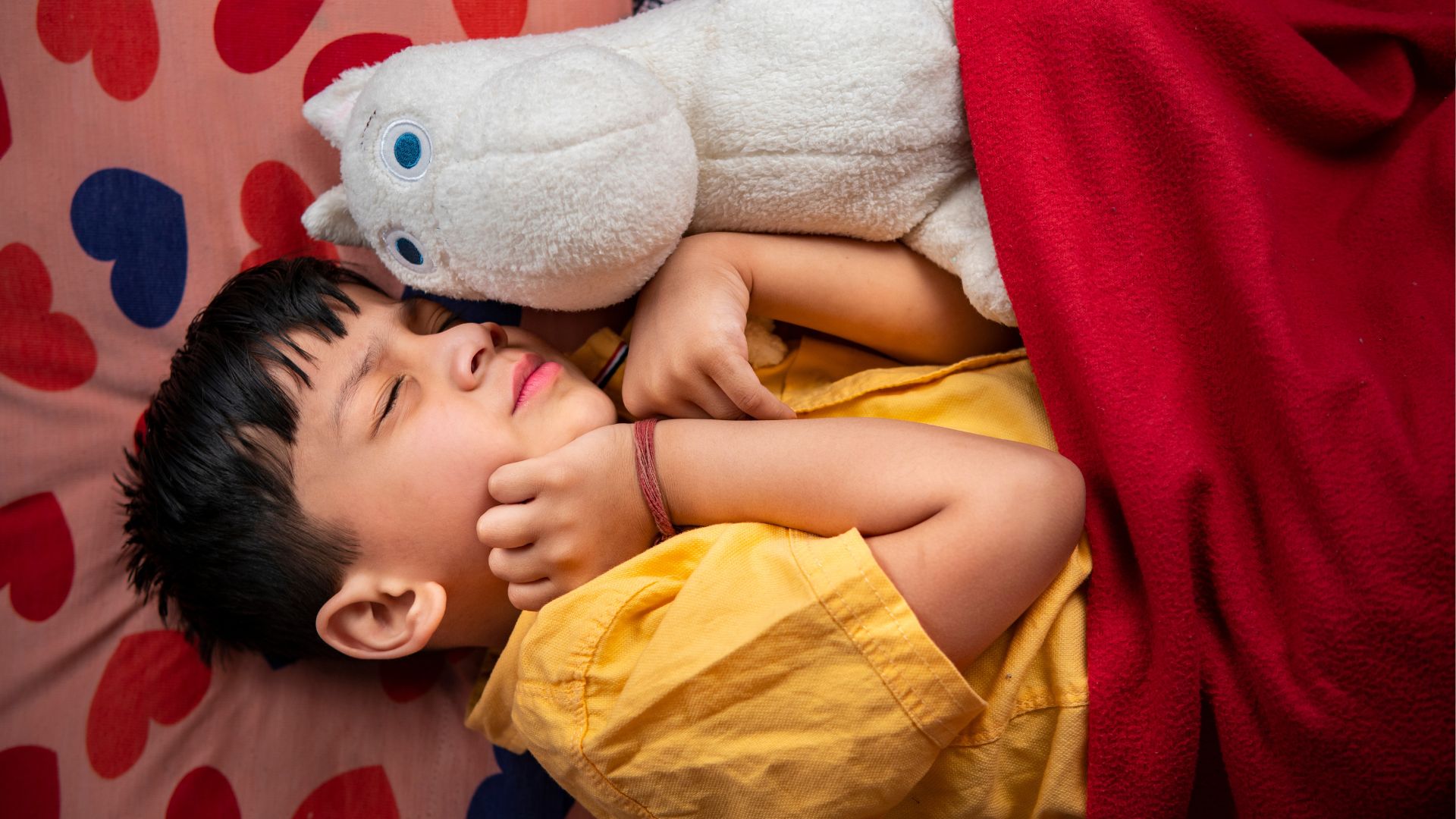Sponsored by

Nightmares vs night terrors: Experts explain the difference and how to manage them
How to tell the difference between nightmares vs night terrors, according to sleep experts

If you want to know what the key differences between nightmares vs night terrors are, you're not alone. Nightmares and night terrors are often thought to be the exact same thing, but they actually couldn't be more different.
Unlike some other sleep issues, managing nightmares and night terrors isn't straight-forward, so we've called on three leading sleep experts to explain the key differences between them, when they're likely to occur during sleep, and how they should be treated.
As part of Sleep Awareness Week 2024, sleep expert Dr Neil Stanley, Head of Sleep and Behavioural Sciences at Sleep Number Dr. Mark Aloia, and Head of Sleep Science at Sleep Cycle Dr Michael Gradisar discuss when nightmares and night terrors are likely to occur, who are most affected, and the treatments available.
Nectar Mattress: up to 40% off at Nectar Sleep
During Sleep Awareness Week, you can save up to 40% on memory foam and hybrid mattresses at Nectar Sleep. We rate the Nectar Memory Foam as the best mattress for most sleepers with a smaller budget seeking a breathable and supportive all-foam bed to relieve pressure on joints, reducing aches and pains. A queen is now reduced to $649 in the US and £600 with a free bedding bundle in the UK. You'll also get a lifetime warranty and year's sleep trial.
Night terrors vs nightmares: What’s the difference?
What is a nightmare?
While nightmares and night terrors are often thought to be the same thing, they are actually different in a lot of ways. "Nightmares are essentially just bad, scary, horrific, frightening or disturbing dreams," explains sleep expert Dr Neil Stanley.
Stanley compares nightmares to watching a scary movie with disturbing images and plotlines that invoke fear, anxiety, grief or anger. "When you are dreaming, your dreams are real to your mind and body, so a scary dream may seem to be really scary," says Stanley.
"A nightmare is a bad or scary dream and like all dreams if you wake up during it you will remember some of the story and this can be frightening or unsettling."
What is a night terror?
Stanley refers to night terrors as a type of parasomnia (a disorder that leads to unusual physical actions or talking during sleep), and compares them to other sleep disorders such as sleepwalking or sleep talking.
Get instant access to breaking news, the hottest reviews, great deals and helpful tips.
"Night terrors (sometimes referred to as 'Nocturnal panic' in adults) are a physiological anxiety response your body has earlier in the night," explains Dr Mark Aloia, Head of Sleep and Behavioural Sciences at Sleep Number.
"They resemble the fight-or-flight response with a racing heart, sweating, etc. We do not associate them with any particular memory or dreaming at all, we simply wake up in a panic and sometimes we are not even aware we are awake for a while."
Night terrors vs nightmares: At a glance
| Row 0 - Cell 0 | Nightmares | Night terrors |
| Definition | A bad dream that we remember to some degree after waking up | A parasomnia or physiological anxiety response during deep sleep that we have no memory of after waking up. |
| Sleep stage | REM sleep (a.k.a. the dreaming stage); second half of the night | Non-REM stage 3 (a.k.a. deep sleep); first half of the night |
| Causes | Stress, depression, trauma | Age, genetics, tiredness, schedule changes |
| Treatment | Meditation, imagery rehearsal therapy or counselling (if recurring) | Supervision, reassurance |
| Who is it most likely to affect? | Adults and children | Children (2-10 years old) |
Night terrors vs nightmares: What happens
What happens during a nightmare?
Dr Stanley explains that when we have a bad dream with disturbing images or plots, we are experiencing a nightmare: "In just the same way that some movies are scary, some dreams can also be scary."
Nightmare are also more vivid and, as Dr Michael Gradisar, Head of Sleep Science at Sleep Cycle, explains, they can easily jolt you awake. "Because REM sleep is a light stage of sleep, and an unstable stage of sleep, it means people can more easily wake from a nightmare and remember it."
Besides experiencing a bad dream, other things can happen during a nightmare, such as night sweats and changes in heartbeat. "Some people can wake from REM sleep and notice their heart beating rapidly, which is actually normal and eventually it will slow down," Gradisar reassures us.
What happens during a night terror?
"During a night terror, the sleeper can appear distressed or frightened and can exhibit movements that add to the impression that they are terrified of something," explains Stanley. "However unlike a nightmare, if the sleeper wakes up they have no memory of what happened during the night terror."
Another common trait of a night terror is the sleeper appearing to be aware of what's going on, despite being in a deep sleep that's difficult to wake up from. "Despite people often having no memory of the night terror occurring, people can look like they’re awake during a night terror," Gradisar explains.

Can nightmares cause trauma or panic attacks?
While trauma can lead to bad dreams, nightmares – no matter how distressing – cannot lead to trauma. "Nightmares can be damn unpleasant, but they don’t cause trauma – it’s the other way around," clarifies Gradisar.
However, nightmares can sometimes lead to panic attacks, but this depends on both the intensity of the dream and the individual. "If someone interprets their racing heart during a nightmare as not normal or problematic," Gradisar says.
"That they think something is wrong or that they are going to have a heart attack, then these interpretations can escalate their physiological symptoms, which in turn trigger more worries that may send them on the path to experiencing a panic attack."
Night terrors vs nightmares: When they happen
Do nightmares and night terrros occur in the same sleep stage?
There are four stages of sleep. In the first three stages, no rapid eye movement occurs, so these are known as the non-REM stages. However, the last stage does include rapid eye movement, so the final stage is known as REM sleep.
"Night terrors occur during non-REM sleep, while nightmares are associated with REM, or dreaming sleep," says Aloia. "Non-REM sleep is more difficult to fully wake from, which is why we often see children who seem awake and panicked but are not yet fully alert or awake."
The non-REM stage in which night terrors occur is called deep sleep. As the name implies, this is the most intense stage of our sleep cycles. "Night terrors typically occur during deep sleep, and because our memory system doesn’t work that great during deep sleep, people often have no memory of the night terror occurring," Gradisar tells us.
"In contrast, nightmares occur in REM sleep, which is when we are more likely to have dreams. Because REM sleep is a light stage of sleep, and an unstable stage of sleep, it means people can more easily wake from a nightmare and remember it."

When do nightmares and night terrors occur?
As nightmares occur in the last stage of our sleep cycles, Gradisar says that nightmares tend to occur in the second half of the night, while night terrors tend to occur earlier, during the first half of the night.
Night terrors vs nightmares: Who they affect
Who can have nightmares?
Stanley describes nightmares as common and are "just part of our rich dream life". Nightmares can occur at all ages and stages in life, but stressful or traumatic times, both Stanley and Aloia point out, can lead to nightmares. These contextual events means that some people (such as those suffering from depression or PTSD) have more nightmares than others.

Who can get night terrors?
While adults can experience night terrors, age is a huge factor, and they are most common in toddlers and young children. "There’s certainly a link between the intensity of deep sleep and night terrors," says Gradisar. "That’s why you can see more night terrors developmentally between the ages of two to 10 or so years of age, as this period is when humans have the most intense deep sleep."
Night terrors vs nightmares: Why they happen
What causes nightmares?
Dreams can often reflect our current situations and how we feel about them, so a bad dream may reflect a bad situation, memory or emotion. "Nightmares are often related to highly stressful times, trauma, depression, or other contextual situations that set the stage for stressful sleep and dreaming," explains Aloia.
There's a also a link between certain psychological conditions and nightmares. Gradisar and Stanley point out that recurrent nightmares are listed as a common symptom of PTSD.
"We can infer that significant stressful events can cause many nightmares, as the diagnostic criteria for PTSD has included nightmares," Gradisar says. "But nightmares may also occur in the absence of trauma, for example, there was an increased prevalence of nightmares at the beginning of the COVID-19 pandemic."

What causes night terrors?
Deep sleep is more intense during childhood, so toddlers and young children are more prone to night terrors than adults. However, age isn't the only factor, and lifestyle changes and even genetics can trigger night terrors.
"Night terrors are more often related to extreme tiredness, lack of sleep prior to the episode, and schedule changes," explains Aloia. "Sometimes are more common in people who have sleepwalking in their family."
Do nightmares mean anything?
Like most dreams, nightmares can be decoded as they mirror our current situations, thoughts, and emotions. "They typically reflect a period of stress or anxiety and can serve as a reminder for self-care," explains Aloia.
While nightmares may be a reminder to manage stress in our lives, they can also at times signal a mental or emotional issue that needs addressing. "For some people recurrent nightmares of traumatic events may be a symptom of Post-Traumatic Stress Disorder," says Stanley. "Counselling should be sought if the nightmares are linked to a traumatic event."
Night terrors vs nightmares: How to cope
What can you do when you have nightmares?
Although it can be difficult to know how to stop nightmares, Aloia advises practicing de-stressing exercises such as meditation, and he also recommends Image Rehearsal Therapy. "This involves going through the scary dream and imagining it as vividly as possible but changing the ending," he says. Gradisar also promotes this treatment, but also suggests doing so under the guidance of a trained therapist.
What can you do when you have night terrors?
Unfortunately, there's not a lot you can do to treat night terrors, and many people grow out of them. Aloia says that if you are suffering from night terrors as an adult, this could be linked to extreme tiredness, so try to prioritise getting enough sleep.
If your child is suffering from a night terror, Stanley says that the best thing you can do is supervise. "The simple advice is to observe the sleeper to ensure they come to no harm but do not attempt to wake them, however distressed they may appear and however distressing it is for you," he advises.

Frances Daniels is a PPA-accredited journalist and Sleep Staff Writer at Tom's Guide with an MA in Magazine Journalism from Cardiff University. Her role includes covering mattress and sleep news and writing sleep product reviews and buyer's guides, including our Best Hybrid Mattress 2025 guide. She is interested in the relationship between sleep and health, interviewing an array of experts to create in-depth articles about topics such as nutrition, sleep disorders, sleep hygiene, and mattress care. She is also our specialist on mattress toppers — producing bed topper reviews and taking care of our Best Mattress Toppers 2025 guide — and leads content relating to fiberglass-free beds for a non-toxic sleep. Outside of Tom's Guide, she has written for Ideal Home and Marie Claire.
 Club Benefits
Club Benefits











